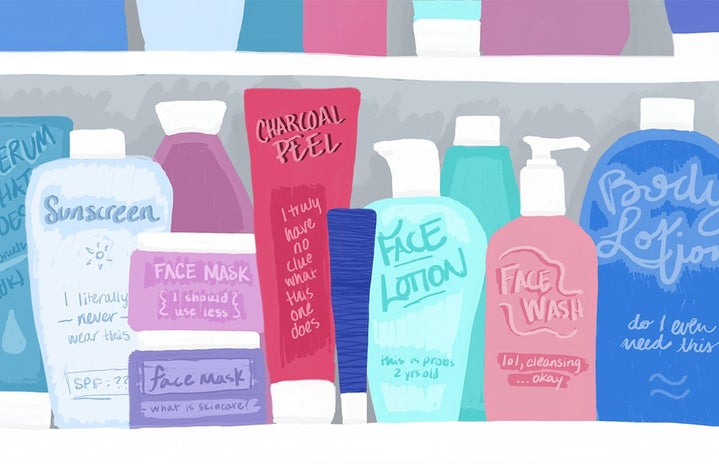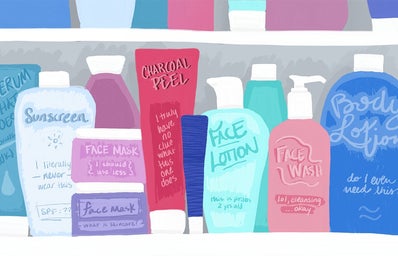In early September, I stared into my phone camera, inspecting my face from all angles as the early morning light seeped in through my dorm window. My eyelids were so swollen that they looked oddly cartoonish and were similarly pink, itchy, and papery to the touch. I thought I may have had an allergic reaction and hoped the rash would disappear in the next few days. I did not know it then, but that day would mark the beginning of a series of moderate to severe eczema flare-ups and the beginning of the long process of learning to manage my skin.
As of 2022, 223 million people are living with eczema. According to the National Eczema Association, eczema is an umbrella term for “a group of inflammatory skin conditions that causes itchiness, dry skin, rashes, scaly patches, blisters and infections.” It is believed to be caused by a combination and/or one of several factors, including an overactive immune system, genetics, environmental factors, and stress. Many people hear the common terms eczema, psoriasis, and even acne and think that these conditions could have little effect on an individual’s well-being or mental health; however, the skin is the largest organ in the body, making up 16% of your body’s mass and it is a highly complex organ that, like virtually any of the other body’s organs, can have a profound impact on our day to day lives.
I was first diagnosed with eczema in early childhood, but throughout the majority of my life, the condition remained a subliminal part of my existence. I would sometimes get an itchy, mild rash in the crooks of my arms or on my neck if I spent too much time around cats or used a harsh laundry detergent, but my eczema flares were minimal and largely avoidable. The cure was simple: slap on moisturizer, avoid triggers, and/or wait the eczema out, and it would heal within the next week.
It was not until the summer of 2023 that my eczema seemed to explode across my face, neck, and body. From August to October, I suffered multiple unrelated infections and, as a result, took several rounds of antibiotics. Although the infections and their corresponding antibiotics cannot definitively be pinpointed as the exact cause of my suddenly worsened eczema, three months of being stressed, sick, and taking harsh medication had undeniably thrown my immune system out of whack, and during this period, my eczema escalated to a new level. Over the next four months, my face and neck would explode with back-to-back flares. Two weeks of an incredibly itchy and painful flare followed a week of blissfully clear skin. Every time I hoped that my eczema was calming down, the cycle would repeat itself. I dreaded waking up in the morning to discover a red rash creeping over my eyelids, highlighting my cheeks, and burning across my forehead or neck.
As a result of these flares, I became incredibly anxious and self-conscious. I sometimes had to force myself to go out with my friends and to my classes because I did not want other people to see how bad the eczema on my face was. Recalling a moment during my lecture when an unknown person tried to speak with me, I kept my head down as I spoke because I was embarrassed by how red and swollen my eyes were. Similarly, when my friends and I were ready to go to a ball we had waited months for, I found myself incredibly anxious that my eczema would not have subsided by the night the ball rolled around; low and behold, my fear actualized into reality. I tried to cover the eczema on my face with makeup, but the dry flakiness was evident. No matter how many times my boyfriend said, “You look so pretty all the time, even with eczema. I don’t even notice it,” or the fact that my friend had off-handedly said: “I would not have even noticed if you had not pointed it out to me!” that night, I still felt incredibly self-conscious. If I had active eczema, I found myself incapable of feeling remotely comfortable in my skin, and my self-esteem reached an all-time low. I even once had eczema so badly that I went to the hospital thinking it was a severe allergic reaction. On phone calls with my mom, she told me that, like many of her family members who had suffered from eczema, I would have to accept the skin condition as it was, and I needed to work on managing my anxiety alongside my skin.
Although eczema is a chronic condition with no cure, the condition can be managed. Like many, I began using topical steroid creams or corticosteroids. Initially, I was prescribed both 1%-2.5% hydrocortisone cream for my face, as well as a slightly harsher steroid cream for my body, but after completing my research, I found myself frightened by the side effects of prolonged steroid cream use, which according to Healthline, include “allergic reactions, skin atrophy, stretch marks, rosacea, perioral dermatitis, acne, premature skin aging, purpura, hyperpigmentation, and delayed wound healing” alongside the possibility of Topical Steroid Withdrawal (TSW). According to TSW Assist, TSW is “associated with cessation of topical corticosteroids after prolonged and sometimes inappropriate application.” TSW involves “a severe rebound phenomenon, wherein the skin undergoes a period of intense inflammation and distressing symptoms following TCS cream discontinuation.” I was particularly nervous about applying steroid cream to my eyelids, which, according to the National Eczema Society, “when applied over weeks or months [to the eyelids] can lead to glaucoma or cataracts” due to the thinness of eyelid skin. Alongside my fears of potential side effects that came with misuse or prolonged use of the medication, steroid cream proved to be effective at calming the flares short term, but my eczema always returned with the cessation of the creams. After a short period of using the steroid creams, I found an allergist who prescribed me an alternative medication for facial eczema known as Pimecrolimus.
As of now, I have learned how to better manage my eczema and the emotional effects that come with a skin condition. Similarly, after the series of infections and antibiotics ceased, my eczema has gradually lessened, and I am no longer getting flare-ups on my face. Although I still have lingering anxiety and often find myself lying in wait for a sudden flare-up, I have learned a lot from this experience:
- My Eczema is Chronic & Incurable
This may seem like an obvious one, but when people are suffering from constantly itchy skin, which can be so severe it affects their sleeping abilities and causes them to scratch until they bleed, they are oftentimes hoping for a miracle cure. I was lucky enough not to suffer from extreme itchiness or ever develop blistered infections from eczema, but even so, the condition definitely took a toll on my well-being, and I found myself on an emotional rollercoaster every time the familiar rashes returned.
I had to constantly remind myself that eczema is incurable every time my skin would flare. My eczema is not magically going to disappear, and learning to accept its routine coming and going, as well as managing the anxiety associated with it, is part of managing my health and well-being. I would be lying if I said this was an easy feat. Like many other young women, I find myself overwhelmed by the bombardment of beauty standards, and living with a constant itch can be a harsh reminder of the existence of the rash. Yet, eczema is a part of my life. Since a cure has not yet been discovered, I can only celebrate finding the products and medications that help keep my skin happy. It will always be with me, and accepting that fact is crucial to management.
- Moisturizer is Everything
Moisturizing is a key part of anyone’s skincare routine, especially for people with eczema. Moisturizers help lock in the skin’s moisture, which is key to combating dry skin and eczema. While it may seem like all moisturizers are the same, in reality, for many people living with eczema, there are chemicals in everyday skin care products like moisturizers that can trigger or induce flares in some people. According to WebMD, these chemicals include fragrances (which can irritate), retinoids (which are notorious for drying out the skin), ethanol/alcohol, Cocamidopropyl betaine (a foaming agent), and tons more. My two holy grail moisturizing products include Aveeno Dermexa Daily Emollient Cream, which moisturizes and cleanses the skin, and Eucerin Eczema Relief Cream with Colloidal Oatmeal Protection.
- Finding an Eczema Community
Since September, I have followed tons of other young women online with the same skin condition as me, as well as women with psoriasis and women who are going through TSW. I admire them for providing honest advice on the condition, showing their skin at both its worst and best, talking about the mental health effects of the condition, and watching them joke around and live their best lives even when their flare-ups are at full force. Some of my favorite creators who publicly talk about and advocate on behalf of these skin conditions are littlemissplumful, remi.tswjourney, and mackies_moments.
Similarly, one of my favorite recent stories I’ve read about eczema is “At war with my own skin: my life with eczema- and how I find the key to keeping it away,” in which she talks about the relationship between stress and eczema. She also calls attention to the fact that this skin condition is more likely to affect women and that much of the research on the skin condition has been centered around white skin. According to WebMD, “Native Americans and Asian or Pacific Islanders are the two groups that are most affected by eczema.” Following these groups are white and interracial adults, who tend to have higher rates of eczema, but Black and Hispanic children tend to have more severe cases of it. It is incredibly important that this skin condition is examined among a diverse set of people to treat the condition better.
I have ultimately learned a lot from living with a chronic skin condition. It required me to draw upon a lot of self-love and acceptance. It also taught me that my friends, family, and others around me are incredibly supportive. Perhaps the most important thing I learned from managing my skin is that our bodies are designed to heal, and even when my skin flares, I am capable of managing and helping it heal.


